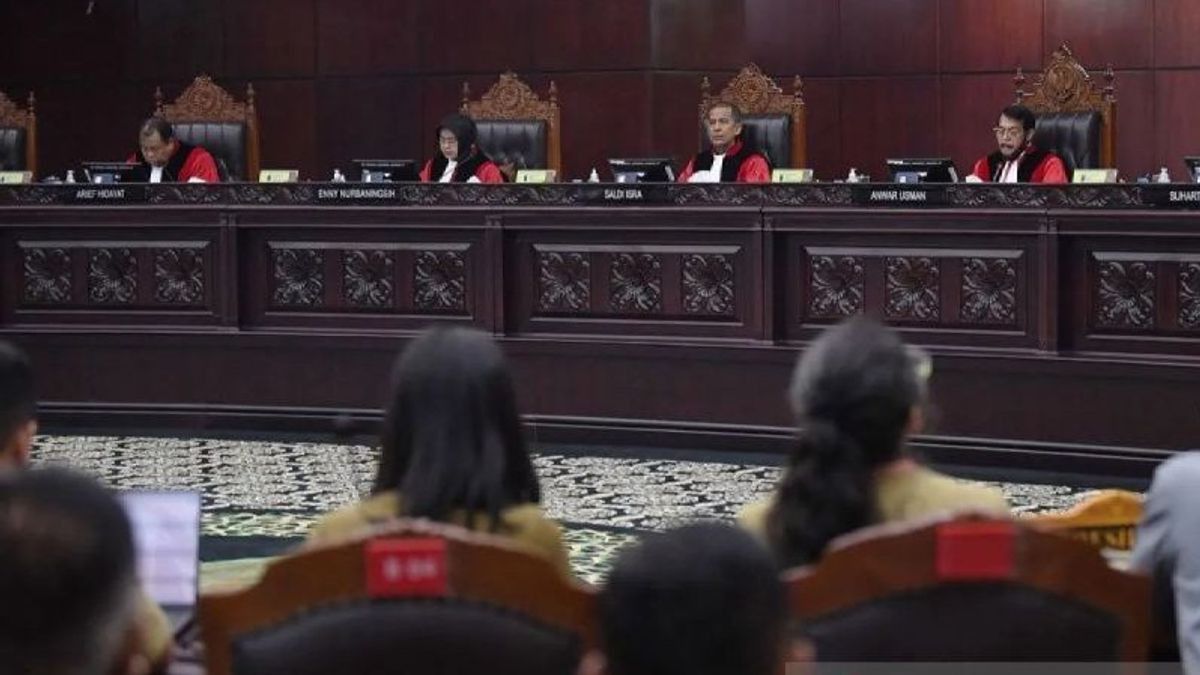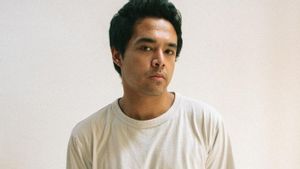YOGYAKARTA - It seems that the effect of the 4 judges of the Constitutional Court on the decision on the requirements for the vice presidential candidate to create a polemic in our country. This is because each judge of the Constitutional Court (MK) has a dissenting opinion that makes the public confused because of a decision that grants the claim for a presidential candidate (candidate) and a vice presidential candidate (cawapres) at least 40 years old or has experience as regional head both at the provincial and district/city levels.
So what are the reasons for the four Constitutional Court Judges? The following is an explanation according to each Constitutional Court Judge;
1. Wahiduddin Adams
Constitutional judge Wahiduddin expressed dozens of considerations. One of them, Wahiduddin said, the age limit for vice presidential candidates is very common by lawmakers. Because, the positions of president and vice president are essentially very different from the position of king/ratu/sultan/kaisar and so on, which are usually raised at any age.
Not only that, said Wahiduddin, if the Constitutional Court grants this request, either completely or partially, then what actually takes place is that the Court carries out practices that are commonly known as legislating or governing from the bench without the support of sufficient constitutional reasons.
"Considering that based on the arguments described above, I think the Court should reject the petitioner's petition," said Wahiduddih, Monday, October 16, 2023, quoted from a copy of the Constitutional Court's decision document.
2. Saldi Isra
Constitutional judge Saldi Isra explained that he rejected the a quo application for the 90/PUU-XXI/2023 problem. This is as stated in the Constitutional Court's decision No. 29-51-55/PUU-XXI/2023. Saldi is also of the view that the court should also reject the a quo application.
"That with regard to the new meaning of the norm of Article 169 letter q of Law 7/2017, I am confused and really confused about where to start this different opinion," said Saldi.
Because, said Saldi, since setting foot as a Constitutional Justice at the Court building on April 11, 2017, or about 6 and a half years ago, this is the first time he has faced an "extraordinary" event. Moreover, Saldi said the incident could be said to be far from reasonable reasoning limits.
"The court changed its stance and attitude only in a secret," said Saldi.
Previously, in the Constitutional Court Decision No. 29-51-55/PUUXXI/2023, the Court explicitly, straightforwardly, and firmly reported that the age in terms of Article 169 letter q of Law 7/2017 is the authority of lawmakers to change it.
"The question is, what important facts have changed among residents so that the Court changed its stance from the Constitutional Court Decision No. 29-51-55/PUU-XXI/2023 by refusing to change to amar granting it in the a quo decision?" said Saldi.
3. Arief Hidayat
Constitutional judge Arief Hidayat said, although there were several other cases that were concerned about the same issue regarding the presidential and vice presidential life limit, he focused on the five a quo problems. Because for him,
estuaran and the core of the constitutionality issues discussed began with a quo cases, especially the third a quo problem, namely Case No. 29/PUU-XXI/2023, Case No. 51/PUU-XXI/2023, and Case No. 55/PUU-XXI/2023, have been examined and tried at the simultaneous plenary session. Meanwhile, Case No. 90/PUU-XXI/2023 and Case No. 91/PUU-XXI/2023, are relatively new problems, but quickly resolved.
"Of the five a quo cases, I feel that there is negative cosmology and anomalies in the five a quo problems that I need to convey," said Arief. "Because this matter disturbs my conscience as a judge who is obliged to show a full, independent and implicit attitude, and free from any political intervention and only oriented to the interests of the nation and state of the Republic of Indonesia based on the ideology of Pancasila."
Arief also mentioned anomalies, namely the scheduling of the trial which seemed long and postponed; discussion in the panel of judges; and case No. 900/PUU-XXI/2023 and case no. 91/PUU-XXI/2023 are withdrawn but always continued.
Regarding cases No. 90 and 91, Arief commented that the applicant had played with the dignity of the judiciary and was not serious in submitting the petition. For Arief, the Court should produce a decision that grants the withdrawal of the a quo petition because the applicant is not serious and professional in submitting the application.
"As a legal consequence of the withdrawal of the case, the applicant cannot cancel the withdrawal of the a quo case and the cases that have been revoked or withdrawn cannot be re-submitted," said Arief.
4. Suhartoyo
Constitutional judge Suhartoyo informed him that he did not give legal or legal standing roles to the applicants for cases no. 29/PPU-XXI/2023 and 51/PUU-XXI/2023. This is because the applicants are not legal subjects who have direct interest in running for president and vice president. So, the applicant is irrelevant in requesting to interpret the norms of Article 169 letter q of Law 7/2017 for the benefit of other parties, as in the petitum of his petition, "said Suhartoyo.
"If it comes from the explanation of the legal considerations above, I am of the opinion on the a quo petition, the Constitutional Court should also not provide legal standing to the applicant and therefore there is no relevance to considering the main application, so that in the a quo decision, the petitioner's petition cannot be accepted," said Suhartoyo.
Accept Some Lawsuits
As previously reported, the Constitutional Court granted the provisions of the presidential and vice presidential candidates with a minimum age of 40 years or experienced as regional heads. The decision on the lawsuit with case number 90/PUU-XXI/2023 filed by a Surakarta University (Unsa) student, Almas Tsaqibbirru, was knocked by the Chief Justice of the Constitutional Court Anwar Usman on Monday, October 16, 2023. Almas admitted that he was an admirer of Gibran.
The Constitutional Court judge granted part of the lawsuit. "To try, grant the petitioner's request for part," said Chief Justice of the Constitutional Court Anwar Usman when reading his verdict, Monday, October 16, 2023.
Anwar said the Constitutional Court had stated Article 169 letter q of Law No. 7 of 2017 concerning General Elections which stated that they were at least 40 years old contrary to the 1945 Constitution and did not have binding legal force as long as they were not interpreted as at least 40 years old or had/occupied positions elected by general election, including regional head elections.
"Ordered the strengthening of this decision in the state news of the Republic of Indonesia as it should," said Anwar Usman.
One of the Constitutional Court judges, Guntur Hamzah, said that his consideration was to grant the lawsuit because some countries had set age limits for their leaders under 40 years.
관련 항목:
"The trend of global leadership continues to tend to a younger age, thus within reasonable reasoning limits under 40 years of age it is possible to occupy positions as president or vice president as long as they meet certain equal or equal qualifications," said Guntur when reading the verdict.
So after knowing the 4 judges of the Constitutional Court had different opinions regarding the decision on the terms of the vice presidential candidate, look at other interesting news in VOI, it's time to revolutionize news!
The English, Chinese, Japanese, Arabic, and French versions are automatically generated by the AI. So there may still be inaccuracies in translating, please always see Indonesian as our main language. (system supported by DigitalSiber.id)

















